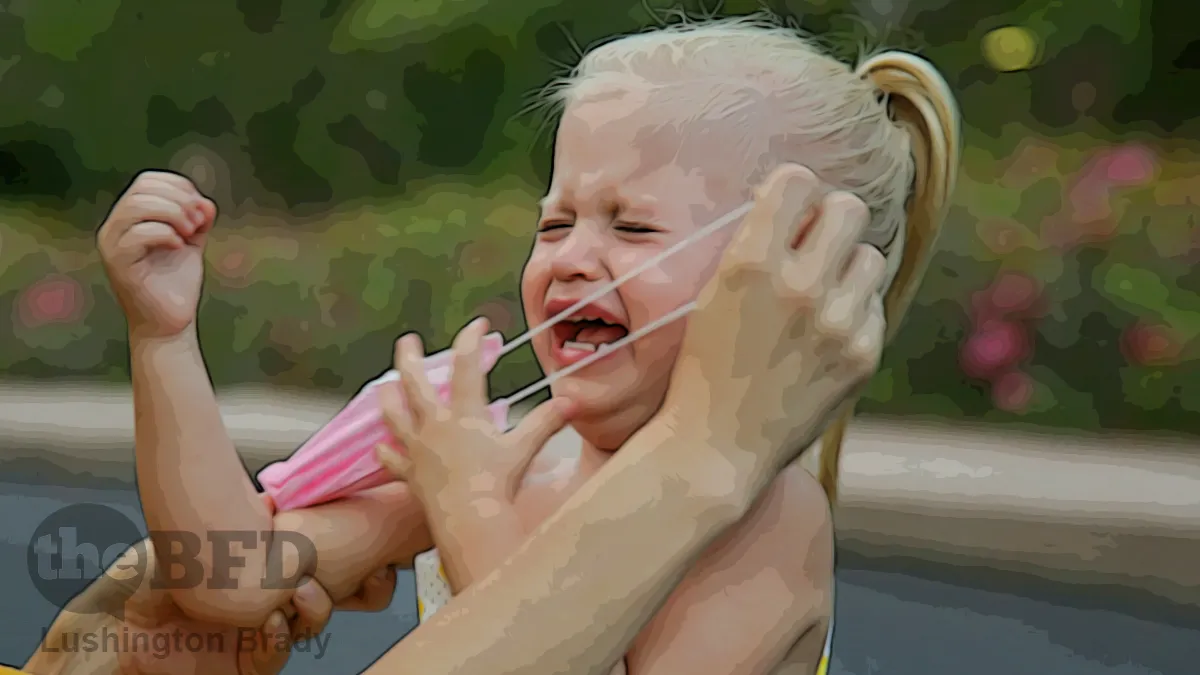Table of Contents
Perhaps the grimmest sight of the Covid era is that of small children with their faces muzzled by the totemic surgical masks. As I’ve already reported, we know for a fact that mass mask-mandates are inflicting appalling damage on a generation of children.
From speech impairment to the kind of cognitive retardation previously associated with the horrific state-run orphanages of communist Romania, the grim toll of mask mandates on the “Covid generation” are becoming ever-more undeniable.
But was it all worth it?
Proponents of mask mandates claim that they are necessary to curb the spread of Covid — a disease, remember, with a 99%+ survival rate for even the old and sick, its most common victims — but is that true? The “science” is equivocal at best. Studies which claim to show they are, are mostly very poorly designed.
On the other hand, real-world comparisons seem to show that masks make little if any difference. For instance, when England dropped mask mandates and Scotland didn’t, the subsequent disease trajectory for each was much the same.
A new study from Finland shows the same.
A recent study posted to the medRxiv* preprint server assessed the impact of face masks on coronavirus disease 2019 (COVID-19) incidence among children aged between 10 and 12 years.
One potential problem with comparing different areas is that they may be very different: comparing, say, densely populated, cold London with lightly-populated, sub-tropical Auckland is obviously fraught with difficulty.
The Finnish study attempted to compare like with as like as possible.
In the present study, the researchers compared the incidence of COVID-19 among children aged between 10 to 12 years, residing in different Finnish cities, with different recommendations regarding the usage of face masks in schools […]
The cities of Helsinki with a population of 6,61,887 and Turku with a population of 1,95,818 were compared for the present study since their baseline incidence of COVID-19 was comparable in August and September 2021. Helsinki had implemented face mask usage at schools while Turku had recommended face mask usage for individuals aged 10 years and above […]
The team compared the 14-day incidences of COVID-19 among individuals aged seven to nine, 10 to 12, and 30 to 49 years.
This was during the period of the much more transmissible Delta variant, so presumably any prophylactic effect of mandatory mask-wearing should have shown up in the data.
The study results showed that there were no significant differences in APC values in August between Helinski and Turku. However, the APC value was higher in Turku in September and November while the APC value was higher in Helsinki in October.
Notably, the incidence of COVID-19 in children aged seven to nine years was similar to that in children aged 10 to 12 years, while no such similarity was observed for adults aged 30 to 49 years in the two cities.
Overall, the study findings showed that there were no substantial differences in the incidence of COVID-19 after wearing face masks in children aged between 10 to 12 years and residing in Helsinki and Turku.
The incidence in adults in both cities was near-identical and much lower than for both groups of children. Adults were vaccinated, but children were not. So, it is likely that vaccination was lowering the incidence in adults — but face masks did nothing.
According to our analysis, no additional effect seemed to be gained from [face mask use], based on comparisons between the cities and between the age groups of the unvaccinated children (10–12 years versus 7–9 years).
Medical News
It should be acknowledged that this is a pre-print of the study, so it hasn’t been fully peer-reviewed, but still, its findings are consistent with other studies.
Bear in mind the damage that mask mandates are inflicting on children, especially the very youngest.
A study from Brown University in the US has found that children born since the beginning of the pandemic have significantly reduced verbal, motor, and overall cognitive performance. By “significant”, they mean 22% lower.
Speech therapists and parents are reporting skyrocketing rates of developmental delays. One speech therapist also says that autism symptoms are spiking: “They’re not making any word attempts and not communicating at all with their family”.
The restrictions also left toddlers struggling with crawling, using the toilet independently and making friends. Delays in learning had also regressed some children to the stage where they needed help with basic tasks such as putting on their coats and blowing their noses.
In the words of UNICEF education chief Robert Jenkins, “Quite simply, we are looking at a nearly insurmountable scale of loss to children’s schooling.”
And all for nothing.









